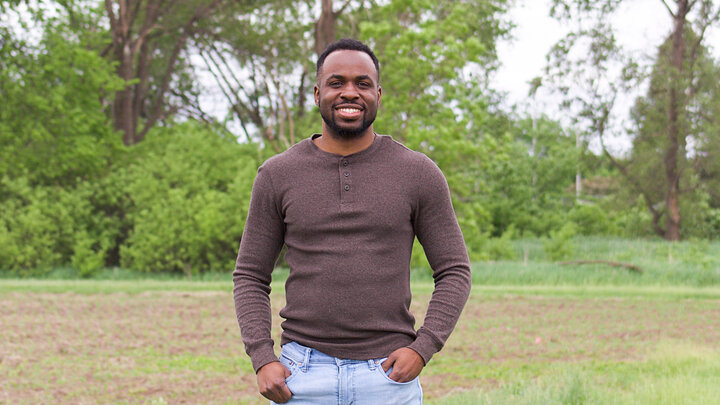Michael Tross, University of Nebraska–Lincoln doctoral student studying integrated plant biology, is the recipient of the competitive Developing Emerging Leaders and Talent in Agriculture Fellowship from Corteva Agriscience. Tross is advised by James Schnable, University of Nebraska–Lincoln Department of Agronomy and Horticulture professor and the Dr. Charles O. Gardner Professor of Agronomy.
The Corteva DELTA fellowship is a two-phased program encouraging diverse talent to apply their skills toward sustainable and reliable food production. This program includes a research grant for graduate students and postdocs, as well as participation in an annual symposium. The symposium is led by members of Corteva Agriscience Research and Development and provides a technical overview of the company and a chance for students to share their research, network and develop soft skills that are essential to any industry career.
Tross hails from the small town of Sandy Point, located on the small island of Saint Kitts in the Caribbean Sea. After high school, he earned an associate degree which qualified him to teach high school. He spent two years teaching woodworking at the Charles E. Mills Secondary School in Sandy Point.
At the recommendation of a friend, he moved to Nebraska to attend Doane University in Crete on a track and academic scholarship. There he majored in biological sciences and worked with Department of Biology associate professor Tessa Durham-Brooks, on research projects as part of his degree.
This research introduced him to image analysis, python programming and computational biology. He decided to pursue his doctoral degree with Nebraska’s Complex Biosystems Program. The program offers rotations for new students to experience the variety of research being done at Nebraska so they could figure out what they would be most interested in studying. On his second rotation, Tross ended up staying in Schnable’s lab where he found everything he was interested in.
Tross’ research involves using artificial intelligence and machine learning models to enable high throughput plant phenotyping as well as perform statistical genetic analyses to find genes responsible for important agronomic traits. His current project involves using hyperspectral leaf reflectance data and AI models to quantify important agronomic traits.
“The computational tools required to do AI research can be very expensive. I applied for this fellowship because I thought it was a great opportunity to get funding that would further aid in developing my skills as an AI data scientist and supplement my research in artificial intelligence,” Tross said.
Schnable praised Tross as someone he could count on to take on complicated topics across multiple domains of research, tracking down folks with the relevant expertise when he needed it, solving problems on his own and taking the time to thoughtfully explain his progress to other members of the lab. Within just a year of joining his lab, Tross published his first lead-author publication, leveraging 3D reconstructions of a sorghum diversity panel to identify genetic variants controlling leave angle in that species.
“I was elated that I was selected for this fellowship since it is very competitive and my second time applying for it. This fellowship will also allow me to network with industry personnel doing work that is similar to my research,” Tross said.
Mentoring is another skill Tross grew to like while teaching high school.
“You learn when you mentor. Some of the stuff you think that you knew, when you must explain it to somebody, it forces you to think more about it. You are actually learning as well. The soft skill of being able to mentor someone is great,” Tross said.
In 2021 Schnable asked him to mentor Ryleigh Grove as part of the summer Young Nebraska Scientists program.
“I was impressed with the thoughtfulness and patience he brought to the task, and it was a joy to watch Ryleigh’s rapid growth and development as a scientist under his guidance,” Schnable said. “There are many talented and motivated scientists in the world who still do not have the gift of growing and developing others in talented and motivated scientists. I am now convinced that Michael is one of those rare people who can indeed not only light the spark of scientific curiosity and excitement in others, but kindle that spark into developing the new skills, abilities, and habits of thought that will make students more effective scientists for the rest of their lives.”
Schnable said he is confident Tross will go on to have a significant impact on the agricultural industry, or any other field he should choose to apply his skills to upon graduation Spring 2024.




